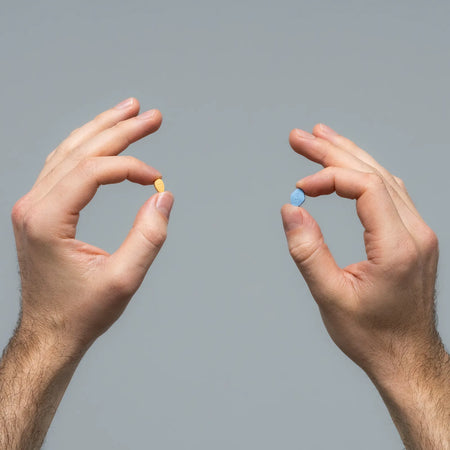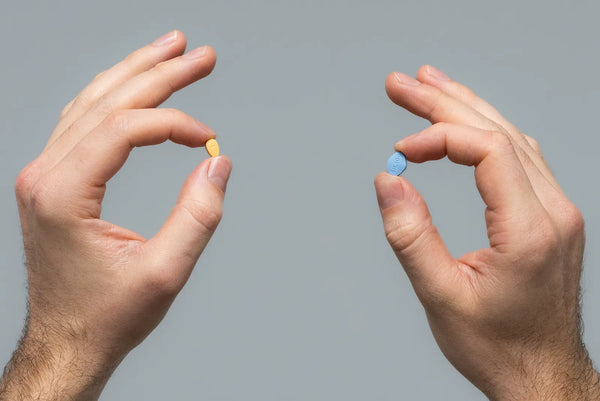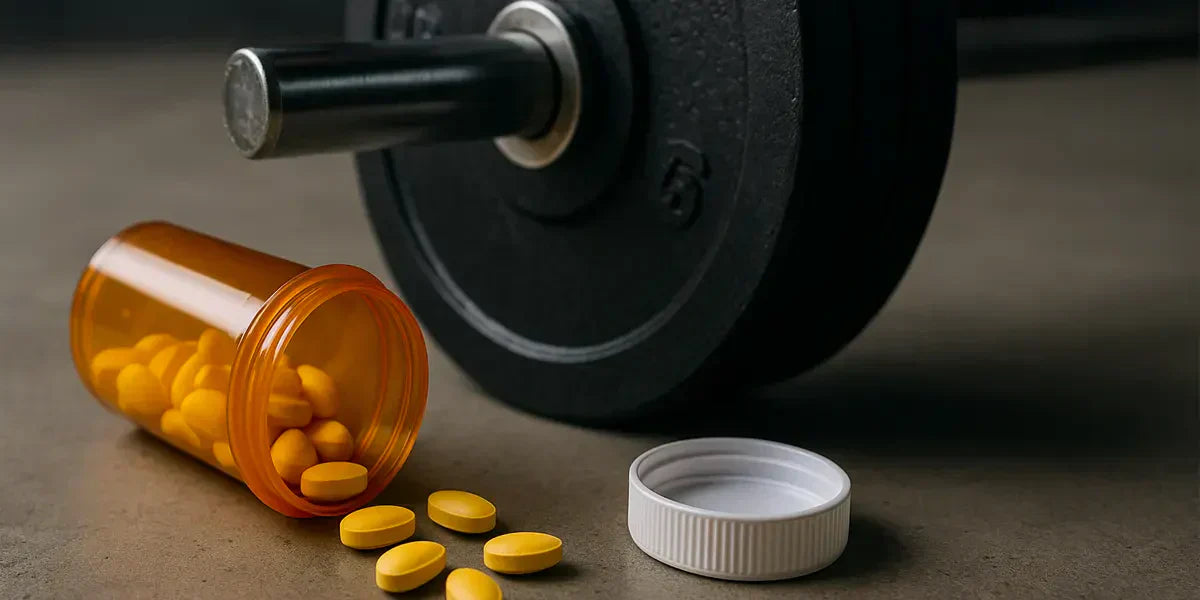Erectile dysfunction is a complex health issue that can be difficult to trace back to a single cause. Biological (also known as organic) factors, such as whether someone has high blood pressure or diabetes or low testosterone levels can contribute to ED, but it’s just as important to acknowledge that psychological factors can also impact erectile function. These less tangible causes are sometimes hard to talk about, but we need to hold space for them because they can have significant effects on quality of life, self-esteem, and confidence.


Generic Viagra (Sildenafil) or Generic Cialis (Tadalafil) Now Available From XYON
Get the more affordable and equally effective options for treating erectile dysfunction. Complete your online consultation in minutes.
What is psychological erectile dysfunction?
Erectile dysfunction is clinically defined as the consistent or recurrent inability to have or maintain an erection sufficient for sexual activity. It can have organic or psychological causes, or stem from a combination of both. Psychological ED, also referred to as psychogenic ED, is defined as ED that is primarily due to psychological or interpersonal factors (Morcos et al., 2025). It’s been associated with mental health disorders such as depression and anxiety, having certain personality traits, acute and chronic stress, performance anxiety, and negative body image (Allen et al., 2023).
How common is psychogenic ED?
It’s difficult to assess how common psychogenic ED is, but one study that analyzed social media posts and other self-reported responses found that as many as 48% of men (average age of 24 based on a 100 person cohort analysis) believed that their ED was rooted in psychological causes (Jiang et al., 2020). Other studies cite the incidence of psychogenic ED to be as high as 85% (Morcos et al., 2025). Based on available data, there may be a relationship between younger age and frequency of experiencing psychogenic ED. In fact, one study that enrolled 1632 participants found that among older men (aged 39-61 years), only 13.8% of individuals attributed their ED symptoms to psychogenic causes (Pozzi et al., 2022).
Key psychological causes of erectile dysfunction
The causes of psychogenic ED aren’t limited to a formal diagnosis of a mental health disorder such as anxiety or depression. The truth is that a range of psychological stressors, including acute and chronic stress, interpersonal or relationship issues, and performance anxiety, can all increase the chances of experiencing ED.
Just being tired, or a little bit distracted during sex, can interfere with the body’s ability to initiate and maintain an erection by directing attention away from sexual stimuli. Things like performance anxiety, anticipating failure, or interpersonal conflict, are all examples of stressors that can redirect attention away from being “present” with your partner, to focusing on your own thoughts, feelings, and sensations. When this happens, the mind and body can become disengaged, making it challenging to sustain an erection (Allen et al., 2023). Additionally, when you’re stressed, this can show up in the body as elevated cortisol (stress hormone) levels and heightened sympathetic nervous system activity—imagine having your fight-or-flight response be constantly “switched on”. Both can work against erectile function by interfering with smooth muscle relaxation, resulting in suboptimal blood flow.
If you suffer from anxiety and/or depression and are taking antidepressants, take note that some of these drugs can contribute to, or worsen ED (Rothmore, 2020). The exact reasons behind how these medications cause sexual dysfunction are not well understood, but some researchers believe that it could be connected to the effects of these medications on serotonin levels. Serotonin is a neurotransmitter that functions as an inhibitor (i.e., it decreases the activity) of the pathways involved in sexual desire and arousal. It’s also said to reduce sensation in parts of the reproductive system and have impacts on ejaculation and orgasm (Higgins et al., 2020).
Having said that, antidepressants can have a huge impact on quality of life with the potential to save lives, so if you’re worried about ED associated with antidepressant use, it’s worth talking to your doctor about your options. Some antidepressants, such as TCAs, may have a lower risk of causing ED or other sexual side effects like delayed ejaculation, compared to say, SSRIs.
Another way that depression can contribute towards ED is through the disruption of hormone interactions and overproduction of certain neurotransmitters known as catecholamines. Catecholamines include epinephrine, norepinephrine, and dopamine, and when levels are high, they can start to influence the behavior of nerve signals to the penis, impacting smooth muscle relaxation and impeding blood flow (Chen et al., 2023).
Symptoms of psychological impotence
The symptoms of psychological ED and ED due to organic or biological causes are similar. Clinically, ED is defined as a recurrent inability to have or maintain an erection sufficient for sexual activity. You may be suffering from ED if you are able to get an erection sometimes, but not every time you want to have sex, or if you notice a change in the quality of your erections whether that’s differences in firmness or how long they last.
How psychological ED affects mental health
Research shows that men who experience ED often also struggle with mental health. In fact, it’s so common that some experts theorize that ED and mental illness affect each other bidirectionally, which means that the conditions influence each other like a feedback loop. This has been illustrated in studies including one large meta-analysis that found that depression leads to an increased risk of ED and that experiencing ED is associated with a three-fold increase in the risk of a later diagnosis of depression (Atlantis & Sullivan, 2012).
With psychogenic ED, there is usually a pre-existing psychological condition(s) and/or stress causing the sexual dysfunction but what the study data seems to suggest is that even men who don’t have pre-existing mental health stressors can find themselves at a higher risk for mental health disorders if they experience ED.
Among men with ED, the incidence of mental health disorders is generally higher. A large study involving 958 participants reported that approximately 80% of patients with ED had anxiety and depression, compared to only approximately 14% of men without ED (Yang et al., 2019). The same study also observed that younger ED patients (≤ 35 years) were more likely to experience and have severe anxiety and depression. If younger men are more likely to experience negative mental health effects because of their ED, what effects could this have on well-being over time?
One systematic review of nine studies over a 20-year period on ED and quality of life found that men with ED experienced a more significant decline in psychological, social, and physical well-being compared to men without ED (Elterman et al., 2021). For some men, depressive symptoms can develop into self-harm and/or suicidality (Jiang et al., 2020). These findings underscore that treating ED isn’t just about quick fixes for your sex life—it can also be about getting to the root cause of psychological factors and stressors that can have a profound impact on other aspects of your life and wellbeing.
Treatment options for psychological erectile
Psychogenic ED is treatable and may involve a combination of therapy and/or counselling, lifestyle modifications, and pharmacological interventions such as PDE5 inhibitors (PDE5is) that can help restore erectile function. Because psychogenic ED is rooted in psychological stressors, it’s important that these unseen factors are also addressed.
PDE5is include drugs like sildenafil (generic Viagra) and tadalafil (generic Cialis). These medications help treat ED by blocking an enzyme called PDE5 and preventing it from breaking down a signaling molecule called cGMP. The role of cGMP is to help encourage smooth muscle relaxation of blood vessels including those that supply the penis. The effect is increased blood flow to the penis, allowing improved erectile function. There are also injectable medications such as bimix, or trimix that can help. Because these medications are injected directed into the base of the penis, they require some expert education by a doctor or nurse to ensure safe administration.
Additionally, lifestyle modifications like ensuring you’re eating a healthy diet, exercising, and getting enough sleep can help lay the foundation for better heart health and lowered stress levels. Your doctor may also recommend doing a blood test to determine if your hormone levels (particularly, testosterone) are normal. In some cases, ED can be an early indicator of more serious health problems, such as heart disease. It’s a good idea to consult with a doctor and undergo further investigations if needed.
Finally, even though it’s not a first line treatment for ED, research has shown that therapy and counselling can be a beneficial complement to pharmacological treatment for many men. Modalities such as cognitive and behavioral therapy can be used to help with performance anxiety, increase intimacy and generally improve the quality of relationships with intimate partners. Therapy and counselling can also play a key role in helping you become more aware of stress triggers and develop effective strategies to manage these in other aspects of your life.
When to see a healthcare practitioner about psychogenic ED
At XYON, we believe that all men should feel comfortable consulting with a trusted healthcare provider about ED and this is especially important if you, or someone you know is grappling with stress or struggling with mental health in any way. Generally, if there is a sudden change in your ability to consistently have and maintain an erection, or if there are noticeable changes in the quality of your erections, we recommend reaching out to a doctor.
Learning about the ways in which your mental health can affect your sex life can be overwhelming. If you take anything away from this discussion, it’s that you’re not alone, it’s not “just in your head” and ED is treatable. Taking care of your mental and physical health is a crucial first step to a better, and a more fulfilling sex life. It might just make you feel closer to the ones who matter the most.
References:
Allen, M. S., Wood, A. M., & Sheffield, D. (2023). The psychology of erectile dysfunction. Current Directions in Psychological Science, 32(6), 487–493. https://doi.org/10.1177/09637214231192269
Atlantis, E., & Sullivan, T. (2012). Bidirectional Association Between Depression and Sexual Dysfunction: A Systematic Review and Meta-Analysis. The Journal of Sexual Medicine, 9(6), 1497–1507. https://doi.org/10.1111/j.1743-6109.2012.02709.x
Chen, W.-K., Zhou, T., Yu, D.-D., Li, J.-P., Wu, J.-G., Li, L.-J., Liang, Z.-Y., & Zhang, F.-B. (2023). Effects of major depression and bipolar disorder on erectile dysfunction: a two-sample mendelian randomization study. BMC Medical Genomics, 16(1). https://doi.org/10.1186/s12920-023-01498-8
Ciaccio, V., & Di Giacomo, D. (2022). Psychological Factors Related to Impotence as a Sexual Dysfunction in Young Men: A Literature Scan for Noteworthy Research Frameworks. Clinics and Practice, 12(4), 501–512. https://doi.org/10.3390/clinpract12040054
Elterman, D. S., Bhattacharyya, S. K., Mafilios, M., Woodward, E., Nitschelm, K., & Burnett, A. L. (2021). The Quality of Life and Economic Burden of Erectile Dysfunction. Research and reports in urology, 13, 79–86. https://doi.org/10.2147/RRU.S283097
Higgins, A., Nash, M., & Lynch, A. M. (2010). Antidepressant-associated sexual dysfunction: impact, effects, and treatment. Drug, healthcare and patient safety, 2, 141–150. https://doi.org/10.2147/DHPS.S7634
Jiang, T., Osadchiy, V., Mills, J. N., & Eleswarapu, S. V. (2020). Is It All in My Head? Self-reported Psychogenic Erectile Dysfunction and Depression Are Common Among Young Men Seeking Advice on Social Media. Urology, 142, 133–140. https://doi.org/10.1016/j.urology.2020.04.100
Morcos, M., Jeryous Fares, B., Golrokhian-Sani, A.-A., Morcos, M., Flannigan, R., Breau, R. H., & Witherspoon, L. (2025). Prevalence of mental health evaluation in erectile dysfunction clinical trials. The Journal of Sexual Medicine. https://doi.org/10.1093/jsxmed/qdaf173
Pozzi, E., Fallara, G., Capogrosso, P., Boeri, L., Belladelli, F., Corsini, C., Costa, A., Candela, L., Cignoli, D., Cazzaniga, W., Schifano, N., Ventimiglia, E., D’Arma, A., Montorsi, F., & Salonia, A. (2022). Primary organic versus primary psychogenic erectile dysfunction: Findings from a real‐life cross‐sectional study. Andrology, 10(7), 1302–1309. https://doi.org/10.1111/andr.13212
Rothmore J. (2020). Antidepressant-induced sexual dysfunction. The Medical Journal of Australia, 212(7), 329–334. https://doi.org/10.5694/mja2.50522
Yang, Y., Song, Y., Lu, Y., Xu, Y., Liu, L., & Liu, X. (2019). Associations between erectile dysfunction and psychological disorders (depression and anxiety): A cross-sectional study in a Chinese population. Andrologia, 51(10), e13395. https://doi.org/10.1111/and.13395




